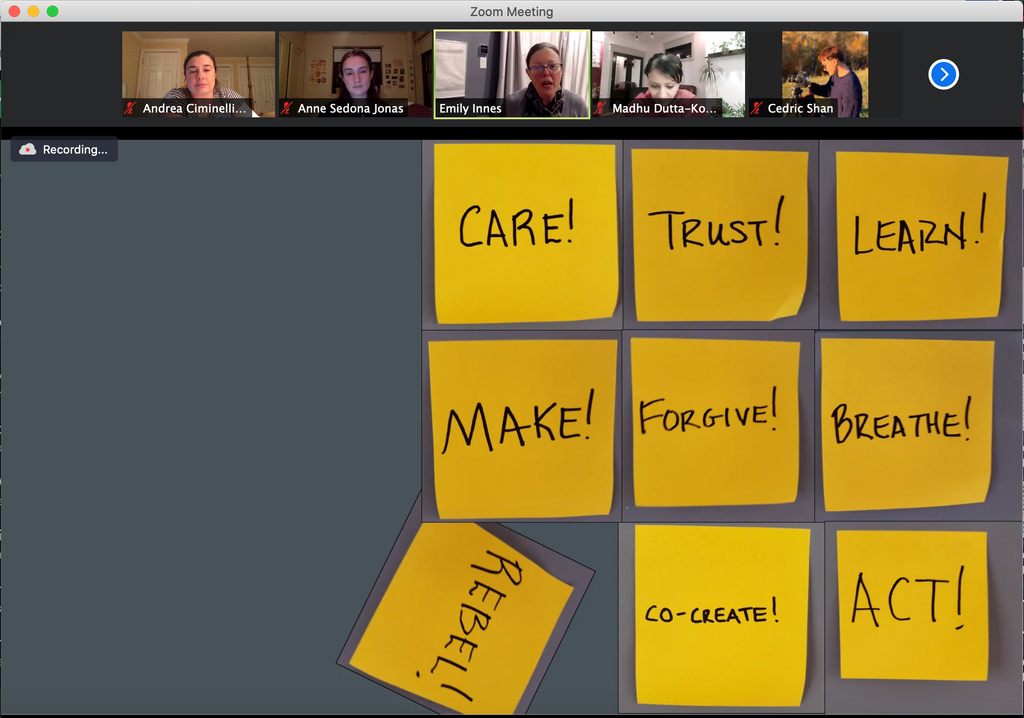BUCPUA professor Emily Keys Innes presents this fall’s #BUcity keynote lecture, “The Early Days: Next Steps”

On Oct. 28, Emily Keys Innes, director of planning at Harriman and CPUA adjunct professor, presented her keynote lecture, “The Early Days: Next Steps” to a group of eager students, faculty, and CPUA community members.
The lecture began with a literary introduction, an epigram by Alasdair Gray––borrowed from Dennis Lee’s 1972 “Civil Elegies”––which reads: “Work as if you live in the early days of a better nation.”
The epigram, Innes said, gives us “a moment to think about how we rise to meet challenges,” many of which are “something larger than what each of us can do alone.”
The power of the planner and their work, then, is to make the active choice to be present in the world. And that work, Innes said, is “at its base about creating a new future. What we do is a deeply social act. Our work requires us to collaborate with others into acts that will shape the future of the communities in which we live.”
Innes guided her presentation by analyzing individual words from the epigram. She began with the word “world,” explaining that as humans generally, and as planners specifically, we move through countless intersecting worlds throughout our day.
Whether it be the roads we drive on, the neighborhoods we drive through to get to work, the buildings we work in, etc. we must consider how each world intersects with one another and consider the lived experiences of the people in those worlds.
The first step as a planner in addressing these worlds is “defining the world you want to make better,” said Innes. The second step, and perhaps the more challenging one, is understanding that your experience of that world is not always shared by all.
Whether it be zoning that perpetuates social inequalities, or urban renewal that strips neighborhoods of their culture, it can be difficult for residents and planners alike to imagine ways to make the world better.
But, Innes said, it’s not impossible, and planners should strive to begin again, to find out what better means and how to get there. To do this, Innes transitioned into her analysis of the words “early days.”
Using the play Hamilton as an example of collective action toward a specific moment, Innes said it’s important to expand our relationships with one another (and with ourselves) in order to bring our vision of possibility, of what the early days should and could look like, to fruition.
To unpack this relationship-building, Innes identified nine words which serve as “guideposts” to her journey as a planner. The nine words she chose were: care, trust, learn, make, forgive, breathe, rebel, co-create, and act.
To accompany each word, Innes included nuggets of wisdom:
“Care: Care because every decision you make as a planner has an impact on people.”
“Trust: Trust people, especially those you disagree with. Allow new voices into the conversation and trust that their voices will add to the conversation. And trust yourself.”
“Learn: Be humble about what you don’t know.”
“Make: Do something physical with your hands, ignore time as you create, put your tools where you can see them.”
“Forgive: You will run into some seriously nasty people in your career, but you must focus on your larger goal, on your purpose that brought you to planning.”
“Breathe: “Learn to be alone in perfect silence.”
“Work: The most important part of being a planner is that you will accomplish nothing without collaboration. You cannot build without agreement, and you cannot get agreement without compromise.”
“Rebel: Try new things, but think through the norms before you disrupt them.”
“Co-create: Find real joy in working with others to create. Community resiliency is how we work.”
“Act: Our actions have more impact than our words. We cannot argue for the importance of local economies if we buy all of our goods from far away. We need to act by making choices and mistakes and trying again. Our actions must lead to a better world.”
Innes then ended her keynote lecture by asking all attendees to choose a word from her list and send her an email on April 28th, 2021 about the word they chose and what they did with it.
After her lecture, Innes took audience questions on topics ranging from race relations in Boston, the intersection between city planning and public health, bureaucracy, and affordable housing.
Anne Jonas, CAS ’21